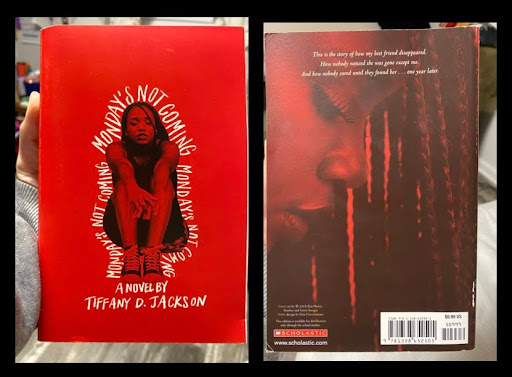
By Natalie Herr ‘25
The Coretta Scott King award-winning novel, Monday’s Not Coming, by Tiffany D. Jackson, constantly gives you shivers up your spine, leaving you with the thought, “What will happen next.” It is a thriller, full of secrets and suspense with a few drops of justice to water down the mystifying storyline. This book shows a strong friendship that completely broke apart, with times of love, difficulty, triumph, perseverance, and peace of mind. It is based on several cases of children who went missing and whose cases weren’t investigated.
This book was published on May 22, 2018, by Katherine Tegen Brooks, and later published by HarperCollins Publishers on April 23, 2019. Jackson has written a plethora of books including; Blackout, Grown, The Weight of Blood, and White Smoke. All with the same genre of young adult fiction with a few pinches of abuse, manipulation, mental illness, and racism. Jackson has received Walter Dean Myers awards, and Coretta Scott King New Talent awards for her books; Let Me Hear A Rhyme, Allegedly, and of course, Monday’s Not Coming.
The two main characters, Claudia and Monday, are two 13-year-old African-American girls. They’d been close for years. It wouldn’t even be called a friendship, it’d be called a sisterhood. They are completely inseparable, they’d do anything and everything together. On the first day of 8th grade, Claudia is so excited to see her best friend. Time goes on, the bell rings and students leave the courtyard and enter the school. Claudia is looking for Monday throughout that whole time, but Monday never shows up. The rest of the book Claudia tries to figure out what really happened to Monday.
Jackson uses the protagonist, Claudia to show the difficulties of having a disability. Throughout the grades before 8th grade Monday always helped Claudia with her homework, and studying for tests. When Monday disappeared, there was no one to help Claudia. She ends up being diagnosed with Dyslexia; a learning disorder that involves reading difficulty as well as writing. This disability causes Claudia’s grades to go down, as well as her confidence.
In addition, Jackson uses Claudia and Monday to show the effects of poverty. Claudia lives in a poor part of Washington. Her mom and dad were frequently working and not around enough to give her everything she needed. When we think about the poor population, the majority of that population is those of color. Monday on the other hand, lives in the ghetto part of Washington, within the projects. Even though Claudia lives in a poor part of Washington, she isn’t exposed to drugs and gun violence as Monday is. When we think about Claudia, knowing she’s African American, and knowing that she lives in a poor neighborhood, we can only conclude that the extra burden of her being dyslexic doesn’t help her situation.
The author creatively uses a 13-year-old girl’s perspective to walk readers through the book. The reader finds things out at the same time that Claudia does. The reader can experience the same emotions as Claudia because they both go through it together. A 13-year-old girl in the 8th grade’s best friend is missing, and she’s determined to find her. The book is filled with letters from Claudia to Monday. Within those letters, it shows their relationship, through the way Claudia writes to Monday. With the tone, and the word use, we could also see that Claudia is dyslexic. Spelling was wrong, backward, or letters were out of order.
The variety of chapter structure keeps readers engaged. In this particular novel, the chapters have four different time periods; the One Year Before the Before, Two Years Before the Before, The Before, and The After. Switching the plot back and forth for each chapter keeps readers interested, and keeps the book from getting boring. It also enables more room for the reader’s imagination to expand.
The theme of perseverance within this book pulls on the reader’s heartstrings. The back cover of the book has a statement from Claudia, “This is the story of how my best friend disappeared. How nobody noticed she was gone except me. And how nobody cared until they found her … one year later.” Throughout the book, Claudia perseveres through school, she watches her grades drop, endures dyslexia and low self esteem, living in poverty, and the burden of not knowing where her best friend is. As well as the disparity to find her. Not to forget the issues that come along with race.
Monday’s Not Coming is a beautiful and mysterious book that starts with a sisterhood that becomes torn apart by poverty, violence, and secrets. Claudia is such a strong young girl, going through what early teens go through, only without her best friend. This book keeps readers on their toes, never bearing a dull moment, as it brings awareness to not only Monday’s case, but a plethora of other cases where African American children have gone missing, and nobody noticed, nobody cared.
